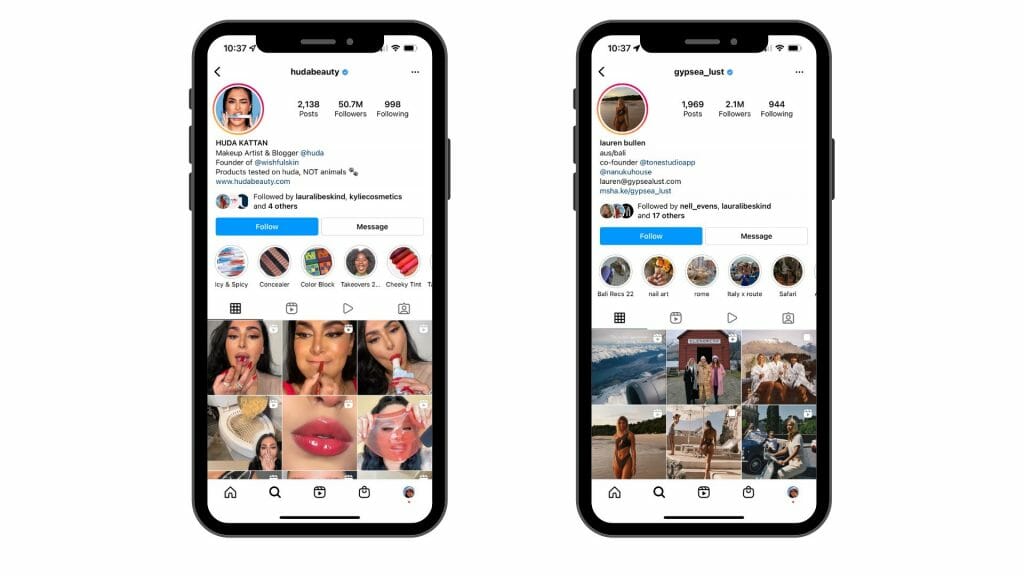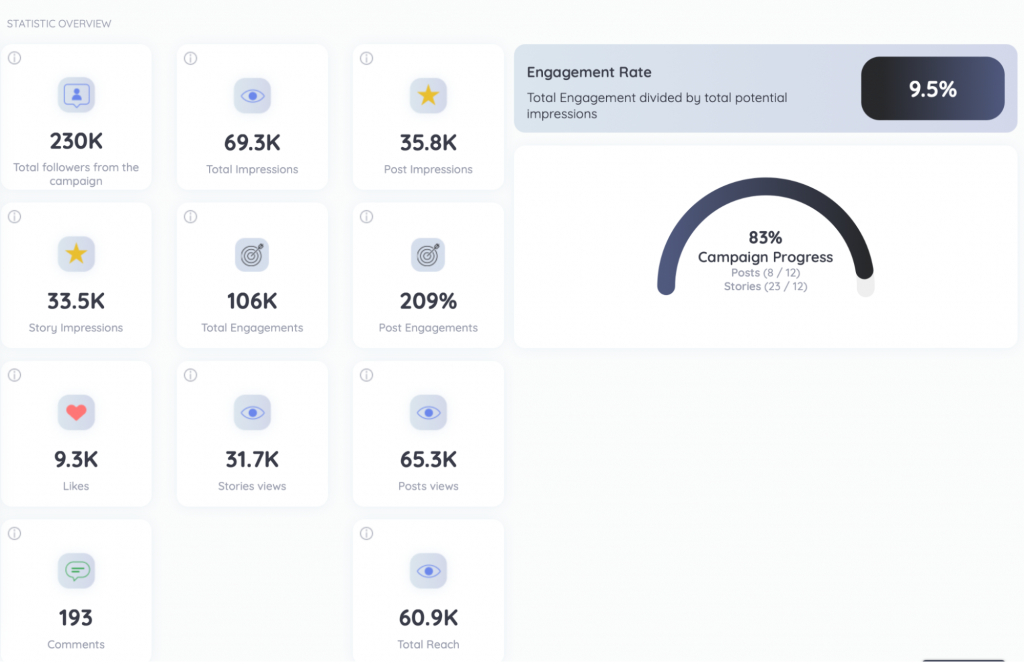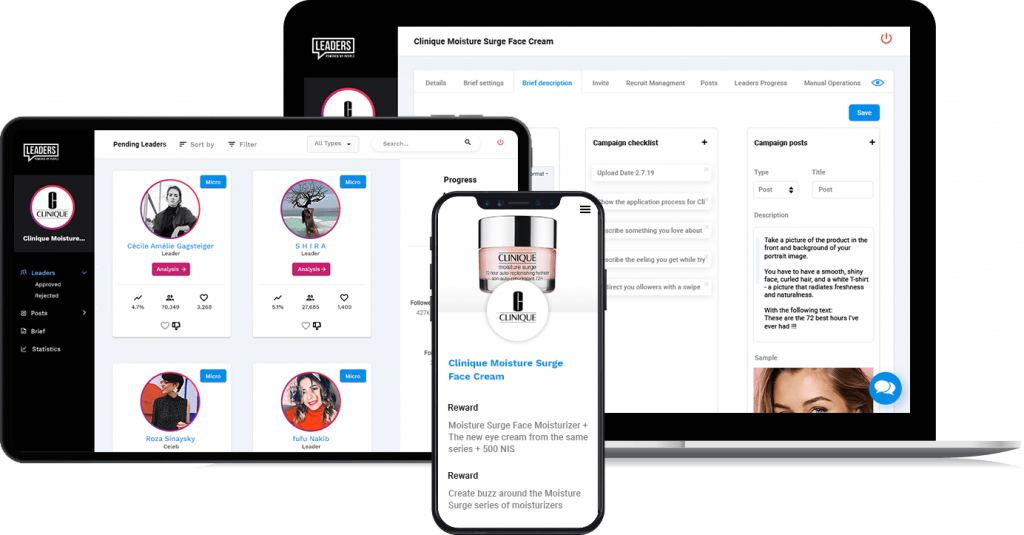Social media has created an entirely new opportunity for marketers to connect with their consumers and share their products and services with the world. There is no doubt that influencer marketing has become a key part of the marketing mix for a majority of companies in the digital age.
An influencer can be described as a creator who shares content on social media and has the potential to motivate or encourage their followers’ behavior and attitudes. Oftentimes, a social media influencer will have a specific niche that they focus on, such as food, fitness, beauty or travel. On the other hand, some creators also post a mix of different types of content, classifying themselves as lifestyle influencer.

Source: Instagram.com
So, how do influencers and the marketing industry come together? Influencer marketing is the process of companies partnering with creators to run campaigns on social media platforms. An influencer marketing campaign typically consists of photos or videos showcasing an influencer promoting a company’s product or service. For example, a campaign can include a series of TikTok videos or Instagram posts or Reels that an influencer publishes on their personal account, which will later be reposted by the brand it's working with. Campaigns can consist of User Generated Content (UGC) that the influencer has created themselves, or professionally shot photos or videos by a brand or production agency.
Partnering with social media influencers can be beneficial when trying to grow your brand awareness and increase your revenues—it is reported that businesses can make nearly $6 on every $1 spent on their influencer marketing campaigns. By posting genuine and authentic content, influencers are able to build trust with their community. Because an influencer's followers trust their opinion, it can be quite easy to encourage them to purchase a product or service that they are seen using in their posts.
While there are a variety of benefits that come along with influencer marketing, such as increased sales and reach, there are also an array of risks involved if your campaign is not executed effectively and you do not partner with the right influencer for your brand. One of these risks can include an influencer misrepresenting your product or service in their content because they do not have a clear understanding of your brand. When an influencer promotes your products on their personal accounts or appears in your campaigns, they are representing your brand and values as a company. It is important to take a variety of factors into consideration before selecting an influencer to work with, such as their audience demographic and interests, engagement rates, fake follower count, average likes per post, etc. To help make this decision easier and manage campaigns more efficiently, many companies are starting to utilize influencer marketing software.
Something to note:
Influencer fraud is a prevalent issue in the marketing industry. Therefore, before you decide to work with a social media influencer, you should perform an extensive analysis of their audience, to identify if they have any fake followers.
Influencer marketing platforms are a key tool for brands to manage and scale their influencer activations. Influencer marketing platforms make life easier for both influencers and brands, acting as a liaison to ensure that the relationship bears fruit and that both sides achieve the results that both parties are looking for. They are “one-stop-shops” when it comes to managing data and accessing all of the must-have tools for influencer campaigns. Using an influencer marketing platform is much easier for brands than managing the campaigns manually.
Let’s take a deep dive into all of the must-have features to look for in an influencer marketing platform:
Must-Have Features To Look for In An Influencer Marketing Platform:
- API Integration
- Tools To Find And Discover The Right Influencers
- Influencer Messaging And Payment Automation
- Automate Campaign Actions
- Generating Real-Time Reports and Tracking The Performance of Posts and Campaigns
- Whitelabel Feature
- Accessing Key Insights To Make The Right Decisions
- Influencer Contact Details
- Other Things To Consider
API Integration
It is crucial that your influencer marketing solution includes an API integration that allows you to view insights and data about influencers and their audiences from different social media platforms. For example, if your company works primarily with Instagram influencers, it is important that the marketing platform you use gives you access to Instagram users’ demographics, such as their age, gender and location, as well as other stats such as their engagement rate. Without an API integration, an influencer marketing platform will be of little to no benefit to your company and is therefore not worth investing in.

Source: IMAI
Tools To Find And Discover The Right Influencers
With millions of influencers out there, it is important to be able to find the right influencer that meets your expectations to best serve your target audience. Are you looking for an influencer to promote your new food product or service? Or are you interested in having a travel influencer stay at your hotel? These days, there is an influencer out there for everything.
You should never settle when selecting an influencer for your campaign - they should meet all of your criteria to best serve your goals. Try to find an influencer marketing platform that has a large database of influencers from various platforms, such as Instagram and TikTok. For example, Influencer Marketing AI (IMAI) provides its customers with access to data on over 120 million influencers. Additionally, the influencer marketing platform should allow you to filter your search based on your specific criteria; this will help you narrow down your selection and find the influencer who is the perfect fit for your brand. These filters should include the location the influencer is based in, their native language, brands they are working with and partnerships, their main interests, age, ethnicity, gender, audience type and hashtags they utilize. Additionally, when searching for an influencer, you should be able to see lookalike accounts, any keywords they use in their posts or in their bio, the average number of engagements their account gets, the number of reels plays, when they last posts, their account type, whether or not their profile is growing, and how many followers they have (this is especially helpful when narrowing down your search to find nano and micro-influencers).

Source: IMAI
Influencer Messaging And Payment Automation
It’s out with the old and in with the new - it’s time to automate your marketing campaigns. Manually messaging influencers to communicate with them about the campaign expectations and requirements can be extremely time-consuming and complicated. Additionally, it can also be challenging to make sure you are up to date with all of the influencers' payments - managing everything yourself can become overwhelming. Using an influencer marketing platform that automates your communication with the influencer and handles their payments can save you a lot of time - and who doesn’t need more time?!
Automate Campaign Actions
Influencer marketing platforms can streamline your marketing efforts to help you more effectively run your campaigns and create a more seamless experience for both you and your clients. Some technical tasks are just too difficult to monitor and complete manually. Many influencer marketing platforms offer features that allow you to create automated processes to boost your posts, target different audiences, and direct message accounts; together, these features will allow you to run your campaigns more efficiently which will ultimately increase your sales and engagement rates.
Generating Real-Time Reports and Tracking The Performance of Posts and Campaigns
Once you have decided to launch your influencer campaign, it is important you continuously monitor how it is doing. Influencer marketing platforms can gain insights in real-time on your campaigns, such as how many likes your post has gotten, the number of comments received, how many times users have engaged with linked items, the number of users who have saved the post, and break down the data to help you analyze the results. The platform you work with should also provide insights into the effectiveness of your campaign and inform you on how to maximize results by suggesting areas where there is room for improvement.

Source: IMAI
Whitelabel Feature
Another beneficial feature to look for in an influencer marketing platform is a white label solution. While purchasing an influencer marketing software has an array of benefits, such as providing you with an extensive analysis on the influencer and their audience, the tradeoff of using one is usually giving up your visual brand identity. With white label solutions, you are able to create a fully branded look, including having your logo on the software, a custom domain and a personalized login for clients. The benefit of opting for a solution with a white label feature is that you can maintain your brand image when working with clients. Additionally, if you are working with multiple clients at once, you can adapt each client's platform to fit their branding needs.

Source: IMAI
Accessing Key Insights To Make The Right Decisions
There are a number of parameters that are worth evaluating for your campaign and for each influencer involved. These may include:
- Audience demographics: The platform should include a clear breakdown of the influencer and their audience's age, gender, cultural background, etc. This will help you narrow down your influencer search based on your target audience's demographic.
- Psychographic analysis: The platform should provide insights into the influencer and their audience's interests, behaviors, and attitudes, etc.
- Influencer data: The platform should report the number of followers (including fake followers), engagement rates, past collaborations, etc.
- An important tip to consider when choosing an influencer to work with: more isn’t always better! Just because an influencer has a large number of followers, it does not mean that they are a good fit for your brand. It is crucial to analyze an influencer's engagement rates, average likes, etc. to see how responsive their community is to the content they post. Often, you are more likely to get better results from your campaign when working with micro or nano influencers as opposed to macro influencers. Remember: the quality of an influencer's followers is much more important than the number of followers.
- Content performance: The platform should update you on how the influencer’s content is performing, including the average number of likes their posts are getting, story views and impressions. This way, you will be able to adjust your campaign settings and content accordingly, to meet your goals. A bonus: check to see if the software offers you insights on the performance of your campaign, this can be a huge help!
- Return On Investment: How much revenue is your campaign generating? The software you purchase should provide you with continuous updates on how much revenue you are earning from your campaign. If over time you notice that your influencer campaign is not generating as much revenue as you expected or would like it to, it could be time to adjust your strategy.

Source: IMAI
Influencer Contact Details
It is crucial that the platform you choose to work with provides you with influencers’ contact details, such as their email and phone number. Without this, you do not have a direct way to contact the influencer and will have to message them on their social media profile, which will result in a lower response rate.
List Creation
A beneficial feature to look out for is the option to create custom lists. This can be useful when you need to create lists of influencers for different categories or interests.

Source: IMAI
KPI’s Estimation
When searching for an influencer, you should be able to analyze their account and view stats on how their content typically performs, to be able to estimate the results that you may receive if choosing to work with them. These key performance indicators should include:
- Story Data: You should be able to view their average number of story views, story views rate, the number of link clicks that their stories receive, story engagement rate and the average price they charge brands for posting a sponsored story.
- Engagement Rates: This is perhaps one of the most important KPI’s that a platform should have. It is crucial to work with an influencer with high engagement rates as it is an indicator that their followers trust their opinion and are interested in their content.
- Reels: It is important your influencer marketing platform provides you with information such as how much an influencer charges for a sponsored Instagram Reel, based on their region and number of followers.

Source: IMAI
Other Things To Consider
- The influencer marketing software that you decide to work with should be easy for both yourself and your client to navigate. The platform should allow you to view the data on your campaign, including the influencers involved and how each of them are performing, in one place so that it is easy to monitor and track.
- Does the platform allow you to set and track your marketing KPIs? This is an extremely important factor to consider when choosing a platform as it helps you evaluate whether or not you are achieving the goals you have set for your campaign, such as reaching a certain number of sales, average likes or impressions.
- Which social media networks does the platform support? You should always make sure that the solution is scalable for your influencer marketing needs. For instance, if you’re marketing on Instagram, but plan on launching campaigns on TikTok or YouTube in the future, you should make sure that the platform allows you to analyze and discover influencers across all platforms. By doing this, you will avoid having to purchase additional software in the future.
- Does the price of accessing the platform fit within your budget? Are there different packages available for purchase? It is always important to find software that works with your budget and needs - if it doesn’t, then it is likely not the right fit for you.
- Are there credible brands that have worked with the platform in the past? Before purchasing the plan for the software, you should conduct thorough research on it to see if there are any testimonials or reviews to ensure it is worth investing in.
- Are there support resources available or a team you can contact if you have questions about the platform?
Conclusion
Now that you have learned about some of the key factors to consider when you are thinking of investing in an influencer marketing solution, the question is—when should you start working with an influencer marketing platform? The real answer to that question is whenever you feel that your brand is ready to let its influencer marketing efforts take off or when you're ready to scale up your efforts without having to grow your team or significantly increase your budget.
Working with an influencer marketing platform can significantly improve your return on investment in terms of time, money and effort spent on a campaign, so it’s worth investing in a solution that will produce results, without hurting your pocket.


